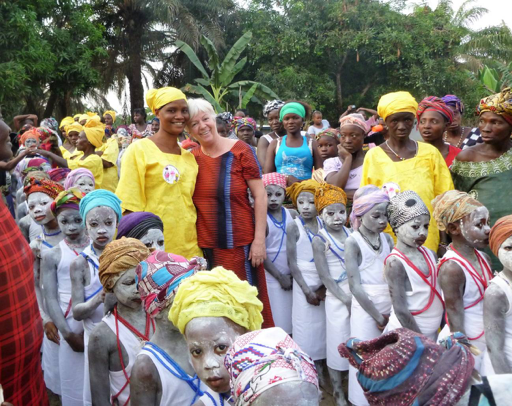THE SHAMEFUL HYPOCRISY OF SIERRA LEONEAN BONDO ‘ABOLITIONISTS’
Madam Yoko, an eighteenth-century female paramount chief in southern Sierra Leone, is credited by historians to have founded the Bondo society in Sierra Leone.

BY MOHAMED AMARA GANDO
The Bondo Society, erroneously described by the western world as Female Genital Mutilation (FGM) is a rich all-female cultural practice in many African countries. Usually, children and young ladies are initiated into the society by way of honoring cultural rites, preparing them for womanhood, and shaping their character. The traditional ceremony is observed in a secluded bush or house forbidden to non-Bondo members.
After weeks of skill acquisition and shaping of character, the initiates are brought out of the shrine for their relatives and other people to see. They are usually dressed in special clothes with white clay robbed on their bodies. The white clay symbolizes purity and the special clothes signify newness and innocence. This is followed by the sounding of drums, singing inspiring cultural songs, and mesmerizing dance steps. During such ceremonies, relatives and well-wishers traveled long distances just to witness such yearly events. The momentous rite is also characterized by warm handshakes and hugs, sharing of food and drinks, merriment, and the flashback or expressed memories of adult and aged ladies.
In Sierra Leone, Madam Yoko, an eighteenth-century female paramount chief in southern Sierra Leone, is credited by historians to have founded the Bondo society in Sierra Leone. She used the traditional practice to prepare girls for marriage and womanhood. Girls and young ladies from Madam Yoko’s Bondo bush were considered by bachelors and married men who wanted to add to their wives as the most befitting wife materials.
From the aforementioned historical highlight, it is safe to say the said cultural practice has been actively observed across the country for about two hundred years. It is evident in every village, chiefdom, town, district, and city in Sierra Leone. The practice is so prevalent that no government has evidently attempted to redefine or abolish it because top government officials are either members of the practice or do not see anything wrong with it. From close observation, about 95% of Sierra Leoneans are supportive of the practice, and it has been so since time in memorial.

Interestingly, for the past 25 years, campaigners against Bondo have been assiduously and persistently mounting loud but void campaigns for the abolition of Bondo. The said period covers the advent of multiparty democracy in Sierra Leone. For 10 years [1996-2007] the so-called abolitionists failed woefully to influence late President Ahmad Tejan Kabba to abolish the practice. They again failed abysmally to persuade erstwhile President Ernest Bai Koroma [2007-2018] to eradicate what many believe to be an outstanding and rich cultural rite.
In fact, the Koroma era gave credence to the traditional practice but however provided safeguards such as consent and unlawful for persons under 18 years. Under the incumbency of President Julius Maada Bio, these campaigners are still pushing, but First Lady Madam Fatima Bio has been very emphatic that she will not speak against the practice. Notwithstanding all of such vehement and informed social and political backlash, these cultural eroding agents are still mapping out strategies and using some media which regrettably do not have cultural controversy in their editorial policy to abolish one cardinal component of Sierra Leone’s culture.
These campaigners perceive the whole practice to be harmful, dangerous, and unhealthy. However, many critics and African conservatives have advanced that anti-Bondo campaigners are mounting such campaigns because of the huge funds they get from western forces who are pushing hard for the practice to be abolished everywhere. From experts’ opinions, the acceptable cultural practices that happen in the Bondo Society cannot be compared to western originated practices such as homosexuality, lesbianism, bestiality, and many more. Can you imagine a man marrying his fellow man and use his anal part for sexual penetration [homosexuality.
What about a woman marrying another woman and behaving like a man [lesbianism]. What is most unbelievable is a human being marrying and getting intercourse with an animal like a dog, horse, etc [bestiality]. These are all unnatural relationships that take place in many western countries. Unfortunately, such practices are being imposed on Africans to legitimize or risk losing foreign aid.
Interesting, money-driven anti-Bondo campaigners do not consider the aforementioned practices and others as harmful and indecent; their primary focus is to sacrifice one of Africa’s cherished cultural traits at the altar of United States Dollars and British Pounds. They lack the guts to advocate against indecent and dangerous [in the typical African context] western practices because that is where their funds emanate. This is indeed hypocrisy at its zenith.
On the grounds of human rights, let it be also known that it is the fundamental right [freedom of association and assembly] of Sierra Leonean females to engage in such a traditional rite recognized by the country’s customary laws and by extension the 1991 Constitution of Sierra Leone [section 170 (1,2&3)]. Frankly, because of modernity and its challenges, I am of the opinion that the government should effectively enforce the existing law against forceful initiation into the practice.
Also, the time spent at the secret bush or hut (Bondo Bush) should be curtailed to make way for other social undertakings; and that Soweis (Bondo Initiators) should be given regular training on sterilization, hygiene, and how to tackle possible health challenges that may stem from the practice. Moreover, the government and partners should facilitate literacy programs for illiterate Soweis so that they can be used together with the educated ones to instruct essential learning on womanhood, hygiene, civics, entrepreneurship, home management, community development studies, and many more.
This can positively appeal to and resonate with millions of members and sympathizers of the said cultural practice, rather than calling for it to be banned in its entirety. The modification of the practice, like highlighted above, sounds acceptable but advocating for its abolition on the pretext of harmfulness is absurd, hypocritical and a deficiency in the cultural consciousness.





